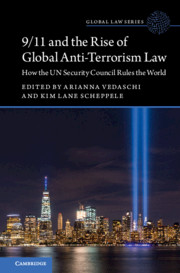Book contents
- 9/11 and the Rise of Global Anti-Terrorism Law
- Global Law Series
- 9/11 and the Rise of Global Anti-Terrorism Law
- Copyright page
- Contents
- Contributors
- Foreword
- Introduction
- Part I The Globalization of Anti-Terrorism Law: Theoretical Frameworks
- Part II Connecting the Global and the Local in Fighting Terrorism: Applications
- 6 Moving toward the Criminalization of “Pre-crime”
- 7 Secret Evidence in Civil Litigation against the Government
- 8 The Regulation of Intelligence Cooperation under International Law
- 9 Predictive Technologies and Opaque Epistemology in Counterterrorism Decision-Making
- 10 Removing Terrorist Content Online
- Conclusion
- Appendix: The UN Security Council and the Rule of Law: The Role of the Security Council in Strengthening a Rules-Based International System
- Index
9 - Predictive Technologies and Opaque Epistemology in Counterterrorism Decision-Making
from Part II - Connecting the Global and the Local in Fighting Terrorism: Applications
Published online by Cambridge University Press: 01 July 2021
- 9/11 and the Rise of Global Anti-Terrorism Law
- Global Law Series
- 9/11 and the Rise of Global Anti-Terrorism Law
- Copyright page
- Contents
- Contributors
- Foreword
- Introduction
- Part I The Globalization of Anti-Terrorism Law: Theoretical Frameworks
- Part II Connecting the Global and the Local in Fighting Terrorism: Applications
- 6 Moving toward the Criminalization of “Pre-crime”
- 7 Secret Evidence in Civil Litigation against the Government
- 8 The Regulation of Intelligence Cooperation under International Law
- 9 Predictive Technologies and Opaque Epistemology in Counterterrorism Decision-Making
- 10 Removing Terrorist Content Online
- Conclusion
- Appendix: The UN Security Council and the Rule of Law: The Role of the Security Council in Strengthening a Rules-Based International System
- Index
Summary
Predictive technologies have become an inseparable part of counterterrorism decision-making. In the past decades, the United Nations Security Council has advanced and legitimized this reliance on predictive technologies, including the substandard levels of certainty and proof they entail, justifying opaque predictive epistemology in counter-terrorism decision-making both within and outside the SC sanction regime. Based on an interdisciplinary scholarship on law, science, and technology, as well as empirical observations from concrete battlefield operations, this chapter identifies three problems stemming from the reliance on predictive technologies in counter-terrorism decision-making. First, the outputs of predictive technologies - often perceived as objective, complete, and neutral - mask the subjective and speculative elements involved in their production. Second, the combination of predictive technologies and opaque epistemology embraces uncertainty as the baseline for knowledge, resulting in a transition from juridical to administrative decision-making process. Third, erroneous decisions often remain unaccounted for, as technology systems are being blamed for mistaken, technology-assisted, human decisions. The chapter develops concrete recommendations to mitigate these problems, and advises the SC to consider the effects of its legitimation of opaque evidentiary standards in the context of the sanctions regime, on the justification of these problematic norms in the context of counter-terrorism battlefield operations.
- Type
- Chapter
- Information
- 9/11 and the Rise of Global Anti-Terrorism LawHow the UN Security Council Rules the World, pp. 199 - 221Publisher: Cambridge University PressPrint publication year: 2021

